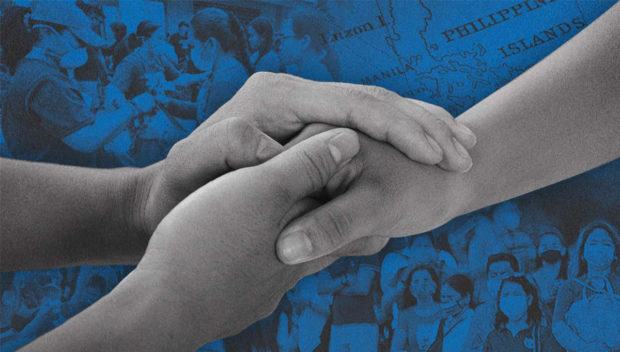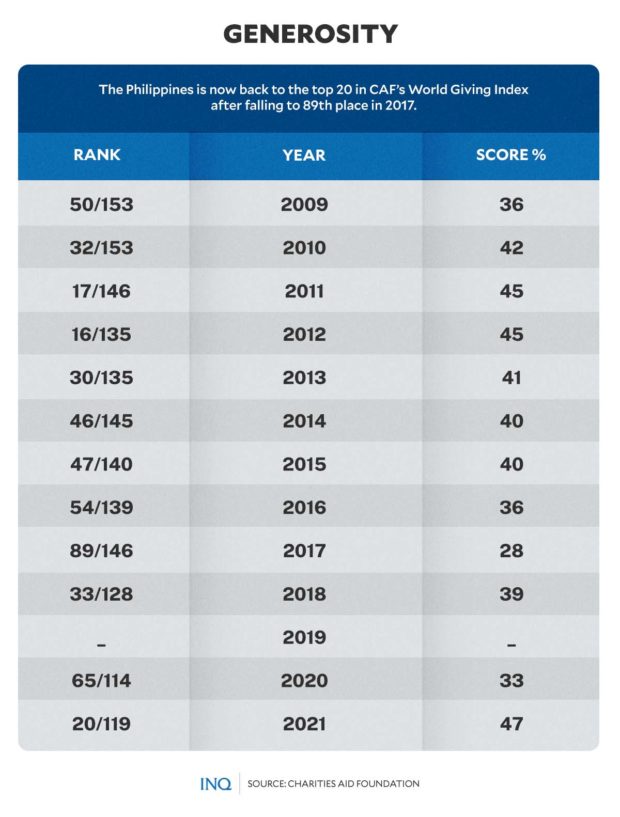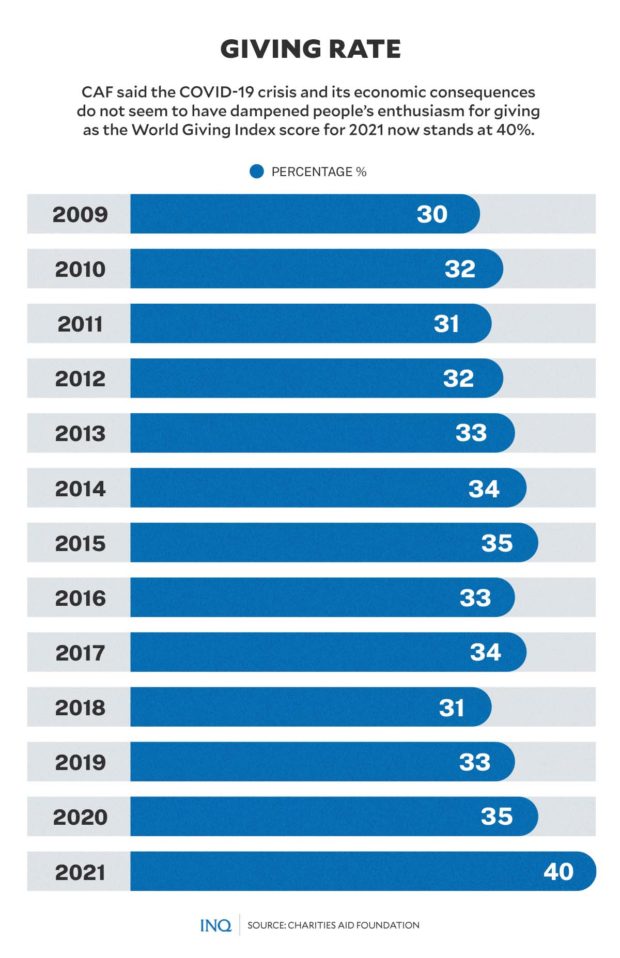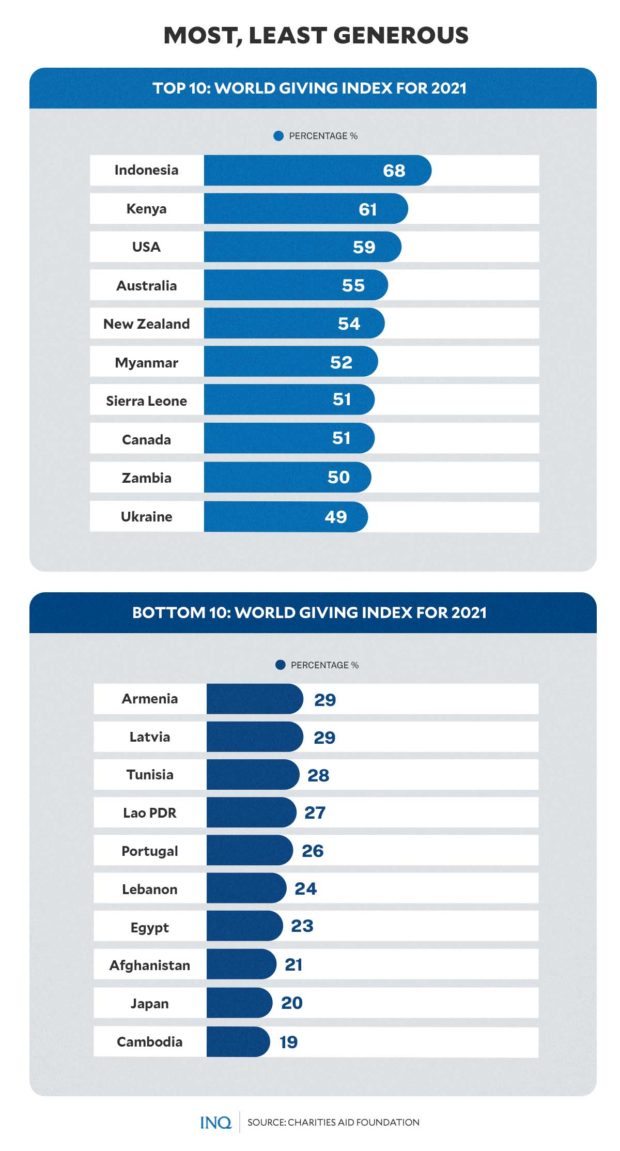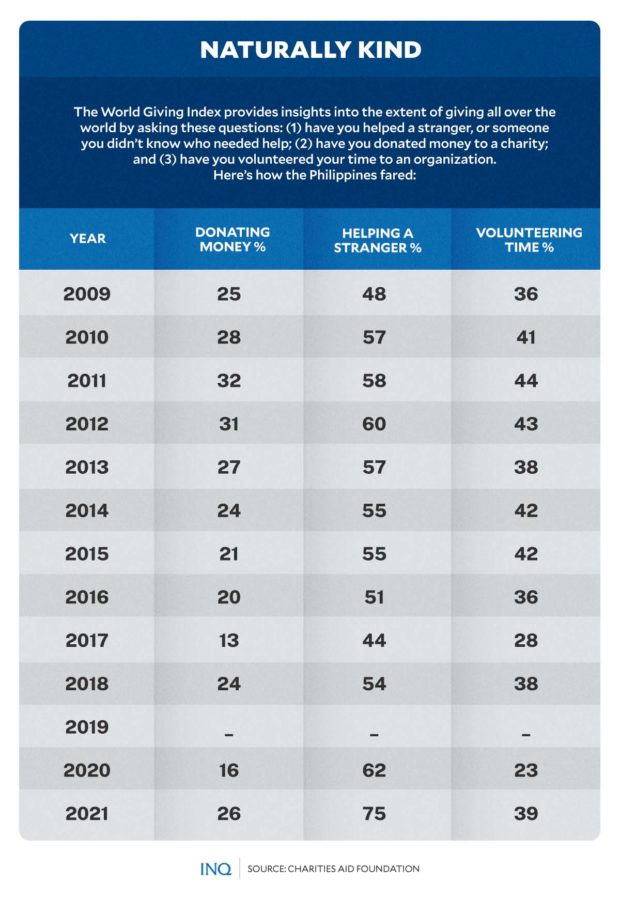PH among most generous countries in 2021 – World Giving Index
MANILA, Philippines—Do you still remember how the Maginhawa Community Pantry inspired Filipinos to give help to millions of people hit by the health and economic crises brought by COVID-19?
It was last year when Ana Patricia Non started the bayanihan for Filipinos hit hardest by the pandemic that brought the economy to a standstill—she placed a bamboo cart in Quezon City where people, who are strangers to each one, can give or get help.
As stressed by the coalition 1Sambayan, the thousands of community pantries—6,715 to be exact—reflected the kindness of Filipinos: “This is the Filipino people saving the Filipino people.”
RELATED STORY: Ana Patricia Non: Her foodcart pushed back vs apathy
Likewise, then Manila Apostolic Administrator Bishop Broderick Pabillo told Radio Veritas that the initiative was a clear representation of Filipinos’ willingness to help. “It’s a very good way of spreading generosity and bayanihan,” he said.
This was well reflected in the latest World Giving Index (WGI), which “provides insights into the giving landscape all over the world as we emerged from the initial stages of the pandemic and began to live with COVID-19 in 2021.”
Based on the Charities Aid Foundation (CAF)-initiated WGI, which examined the extent of giving last year, the Philippines, with a score of 47 percent, was 20th out of 119 countries included on the list.
CAF said the Philippines leaped from 65th in 2020, 33rd in 2018, 89th in 2017, 54th in 2016, 47th in 2015, 46th in 2014, and 30th in 2013. Back in 2011 and 2012, the country was 17th and 16th in the WGI, respectively.
PH strengths
The international charity explained that the list is based on these considerations: (1) have you helped a stranger, or someone you do not know who needed help (2) have you donated to a charity and (3) have you volunteered your time.
RELATED STORY: 1 of 5 Filipinos gives to charity, says MasterCard
As reflected in the WGI, the Philippines had a score of 75 percent for “helping a stranger, or someone you do not know who needed help,” 26 percent for “donating to a charity,” and 39 percent for “volunteering time.”
The 39 percent for “volunteering time” that the country got was the sixth highest, next to Indonesia (63 percent), Kenya (52 percent), Sierra Leone (44 percent), Zambia (43 percent), and Tajikistan (43 percent).
“Giving takes different forms around the globe, and even the definitions of what constitutes charity and generosity differ across cultures,” said CAF chief executive Neil Heslop.
In 2020, the Philippines got 62 percent for “helping a stranger, or someone you do not know who needed help,” 16 percent for “donating to a charity,” and 23 percent for “volunteering time.”
CAF had said many of the countries that have been “stalwarts of our straight-forward gauge of global generosity over the past decade have fallen not just out of the top 10, but the top 20” in 2020, the year the COVID-19 crisis hit.
Heslop, however, stressed that “willingness to give was not drastically diminished, it was [an] opportunity that went missing—the chance to give that had to be sacrificed as countries locked down their people and their economies.”
World kindness
Based on the WGI for last year, while the COVID-19 somehow brought giving to a standstill in 2020, the health and economic crisis “do not seem to have dampened our enthusiasm for giving.”
READ: Spreading acts of kindness in PH
This, as the global WGI score for 2021 stood at 40 percent, with increased participation and giving levels for each of the considerations in the index—helping a stranger, donating to a charity and volunteering time.
Helping a stranger reached its highest recorded level in 2021, with three out of five (62 percent) adults helping someone they did not know, up from 55 percent in 2020. This equates to 3.5 billion people, compared to almost three billion in 2020.
Likewise, more people than ever reported donating to charity in 2021, rising to more than one in three (35 percent) individuals all over the world. There was also an increase in volunteering to almost one in four people (23 percent), up from one in five in 2020.
Indonesia has the highest WGI score for the fifth year in a row. The country maintains its top ranking with a score of 68 percent, largely unchanged since 2020. Indonesia has the highest rate of donating (84 percent) and volunteering (63 percent) in the world.
Kenya was next with a score of 61 percent, up from 58 percent in 2020. All three of Kenya’s scores increased in 2021. The country has a much higher average score for helping a stranger, 77 percent, compared to the global average of 62 percent.
Cambodia scored the lowest of all the countries, with only 19 percent, down from 28 percent in 2020. Japan (20 percent), Afghanistan (21 percent), Egypt (23 percent), and Lebanon (24 percent) make up the rest of the bottom five in 2021.
“The reasons for Japan’s very low score are likely to be cultural in nature – what might be perceived as charity in the United States is likely to be understood as responsibility in Japan,” CAF said.
It likewise stressed that Afghanistan, Egypt and Lebanon “are experiencing widespread poverty or famine, civil unrest or war, and political instability.”
Filipino generosity
As stressed in the website outsourceaccelerator.com, which discussed key Filipino values, “Filipinos are naturally helpful and generous people. They give as much as they can and extend help to family members—and even strangers—when needed.”
“This is seen through the abundance of charity drives and foundations in the Philippines, especially when calamities hit,” it said.
Based on a statement from the World Association of the Non-Governmental Associations, the country is considered to have one of the most vibrant NGO communities, with over 60,000 NGOs registered.
As stated in the study, “Giving and Volunteering among Filipinos,” which was conducted in 1999 and 2000 through the Philippine Nonprofit Sector Project, “Filipinos tend to express their charity in a personal way.”
It found that despite the economic standstill that year, a high proportion of households claimed to have given in the past year.
More than eight out of every ten (86 percent) households said they gave to organizations in the twelve months immediately prior to the survey (1998 to 1999), while two out of three (74 percent) also gave directly to persons in need.
When it comes to volunteering, the study found that three of every four Filipinos 13 years old and over volunteered in the past year (1998 to 1999), based on 1999 population estimates.
“This is significantly higher than the incidence of volunteering in other countries, notably in developed countries such as the United States (56 percent), Canada (31 percent) and the United Kingdom (48 percent).”
READ: What Filipinos can be proud of
TSB
For more news about the novel coronavirus click here.
What you need to know about Coronavirus.
For more information on COVID-19, call the DOH Hotline: (02) 86517800 local 1149/1150.
The Inquirer Foundation supports our healthcare frontliners and is still accepting cash donations to be deposited at Banco de Oro (BDO) current account #007960018860 or donate through PayMaya using this link.
